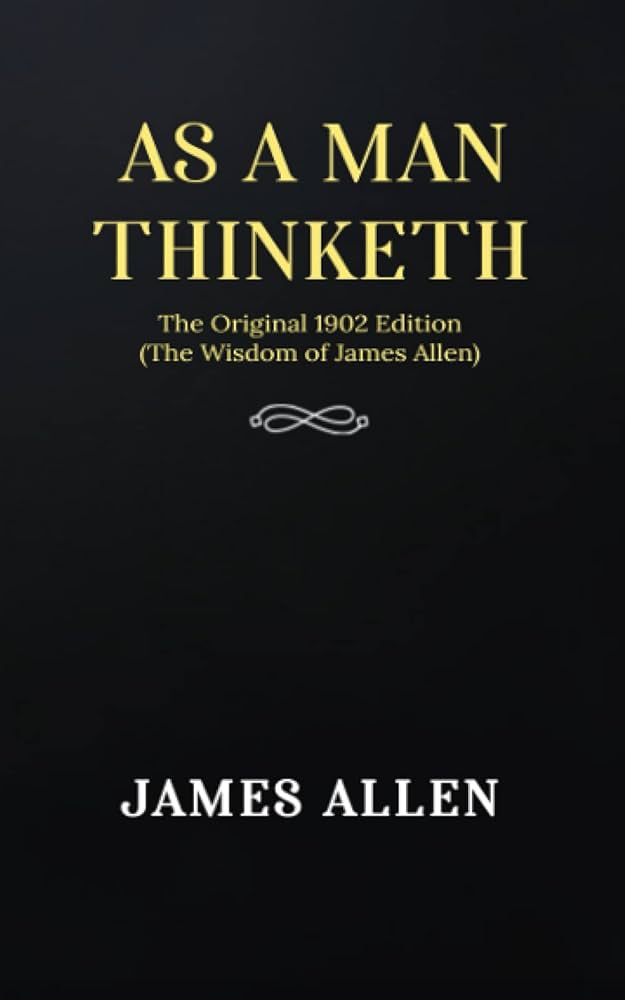
The idea that our thoughts shape our reality echoes through Stoic philosophy, Hindu scripture, and Buddhist teachings alike. As a man thinketh is one such collection of ideas that calls out the reader for being the cause of all negativities (and positivites) in their life, without bullshitting its way through analogies or metaphors. James Allen goes straight into the subject of inner consciousness, values and gratitude, and connects them to our perception of the outer world and ultimately our circumstances.
James Allen’s Core Insight
Allen’s little book insists that:
-
Thoughts are seeds.
-
Habits are the soil.
-
Character is the tree.
-
Destiny is the fruit.
We are not victims of circumstance; rather, circumstance is the reflection of our inner state.
The Stoic Connection
Marcus Aurelius, writing in his tent as Roman Emperor, put it this way:
“The soul becomes dyed with the color of its thoughts.”
For the Stoics, external events are neither good nor bad. What matters is how the mind perceives them. Control perception, and you control your inner life — just as Allen says: master your thoughts, master your destiny.
The Hindu Perspective
The Bhagavad Gita echoes the same law:
“For as a man thinketh, so he is; as he wills, so he acts; and as he acts, so he becomes.”
Hindu philosophy teaches that thoughts → actions (karma) → destiny (prarabdha). Even in mythology, Arjuna’s despair on the battlefield wasn’t solved by changing the war outside; but by Krishna reshaping Arjuna’s inner vision, the perception of the war outside. Once thought aligned with dharma, action followed naturally. In Hindu mythology, the difference between Karma and Dushkarma (sin) is just reason, which is ultimately our thoughts behind a specific action.
The Buddhist Layer — From the Book of Joy
In The Book of Joy, the Dalai Lama explains that perception creates suffering or peace. Two people can face the same event, but their experience differs entirely depending on their thought. Pain is inevitable. Suffering is optional.
Buddhism teaches:
-
We don’t suffer from events, we suffer from the stories we tell about them.
-
A thought, repeated often enough, becomes an identity.
-
Liberation comes from observing and transforming thought rather than being enslaved by it.
This is what Allen meant when he said circumstances mirror the mind. It’s what the Buddha taught when he said:
“We are what we think. All that we are arises with our thoughts.” (Dhammapada 1:1)
The Universal Thread
-
Allen: Thought → Habit → Character → Destiny
-
Stoics: Perception → Judgment → Inner Freedom or Slavery
-
Hinduism: Thought → Karma → Destiny
-
Buddhism: Thought → Perception → Suffering or Liberation
Different languages, same truth: Guard your mind, and you guard your life.
Why This Matters Today
In our age of distraction, our thoughts are constantly hijacked by social media, comparison, fear. Left untended, the mind becomes a field of weeds.
But if we consciously cultivate thoughts of clarity, compassion, and purpose, we align ourselves with wisdom traditions East and West. We plant roses where weeds once grew. We take control of our perceptions, our thoughts and ultimately our consciousness. We then manifest this control into our external world, making life beautiful and simple, as it naturally is.
My Reflection
Reading As a Man Thinketh, I realized Allen wasn’t alone. He was in conversation with Marcus Aurelius, Krishna, and the Buddha, reiterating the universal idea of perception and consciousness.
They all whisper the same reminder across centuries:
🪷 Your world is not built outside-in. It is built inside-out.
The question is — what thoughts are you choosing today?